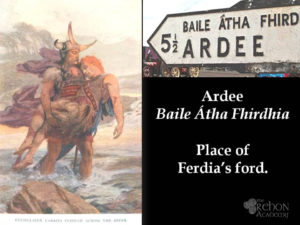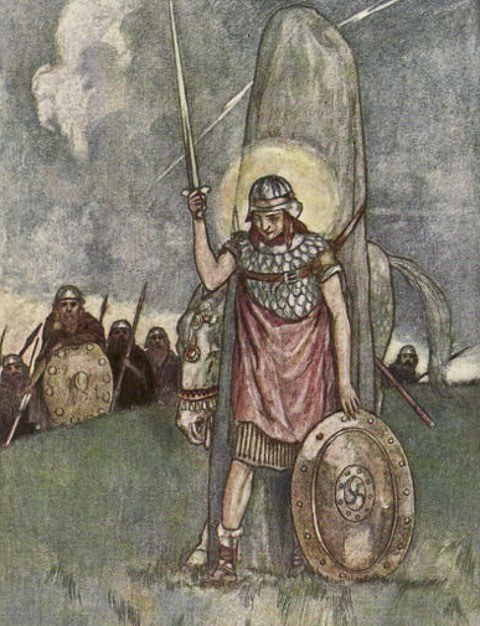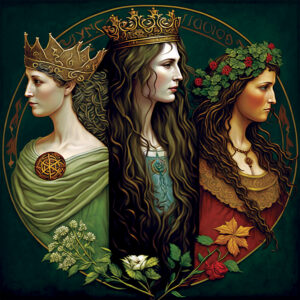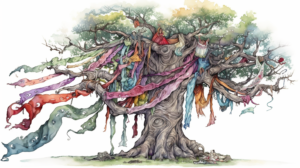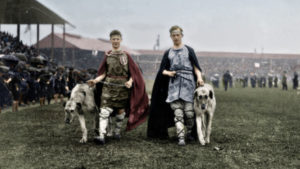We find references to Ogham in the Ulster Cycle of Irish Mythology, which recounts the exploits of the famous boy-hero, Setanta, or to give him his heroic name, Cuchullain.
In the great Gaelic epic called the Táin Bó Cúailnge, or the Cattle Raid of Cooley, we follow Cuchullain as he single-handedly defends his home province of Ulster against the men-of-Ireland, led by Queen Maeve who jealously sought to steal the great bull of Cooley.
What follows are a collection of episodes from the saga which feature mentions of Ogham.
Cuchulain’s First Foray
After a year and a day of training in warfare under Skatha, Cuchulain returned to Erin, eager to test his prowess and to win Emer for his wife.
So he bade harness his chariot and drove out to make a foray upon the fords and marches of Connacht, for between Connacht and Ulster there was always an angry surf of fighting along the borders.
And first he drove to the White Cairn, which is on the highest of the Mountains of Mourne, and surveyed the land of Ulster spread out smiling in the sunshine far below and bade his charioteer tell him the name of every hill and plain and dūn that he saw.
Then turning southwards he looked over the plains of Bregia, and the charioteer pointed out to him Tara and Teltin, and Brugh na Boyna and the great dūn of the sons of Nechtan.
“Are they,” asked Cuchulain, “those sons of Nechtan of whom it is said that more of the men of Ulster have fallen by their hands than are yet living on the earth?”
“The same,” said the charioteer.
Then let us drive thither,” said Cuchulain.
So, much unwilling, the charioteer drove to the fortress of the sons of Nechtan, and there on the green before it they found a pillar-stone, and round it a collar of bronze having on it writing in Ogham.
This Cuchulain read, and it declared that any man of age to bear arms who should come to that green should hold it geis for him to depart without having challenged one of the dwellers in the dūn to single combat.
Then Cuchulain flung his arms round the stone, and, swaying it backwards and forwards, heaved it at last out of the earth and flung it, collar and all, into the river that ran hard by.
“Surely,” said the charioteer, ” thou art seeking for a violent death, and now thou wilt find it without delay.”
Then Foill son of Nechtan came forth from the dūn, and seeing Cuchulain, whom he deemed but a lad, he was annoyed.
But Cuchulain bade him fetch his arms, “for I slay not drivers nor messengers nor unarmed men,” and Foill went back into the dūn.
“Thou canst not slay him,” then said the charioteer, “for he is invulnerable by magic power to the point or edge of any blade.”
But Cuchulain put in his sling a ball of tempered iron, and when Foill appeared he slung at him so that it struck his forehead, and went clean through brain and skull; and Cuchulain took his head and bound it to his chariot-rim.
And other sons of Nechtan, issuing forth, he fought with and slew by sword or spear; and then he fired the dūn and left it in a blaze and drove on exultant.
And on the way he saw a flock of wild swans, and sixteen of them he brought down alive with his sling, and tied them to the chariot; and seeing a herd of wild deer which his horses could not overtake he lighted down and chased them on foot till he caught two great stags, and with thongs and ropes he made them fast to the chariot.
But at Emain Macha a scout of King Conor came running in to give him news. “Behold, a solitary chariot is approaching swiftly over the plain; wild white birds flutter round it and wild stags are tethered to it; it is decked all round with the bleeding heads ot enemies.”
And Conor looked to see who was approaching, and he saw that Cuchulain was in his battle-fury, and would deal death around him whomsoever he met; so he hastily gave order that a troop of the women of Emania should go forth to meet him, and, having stripped off their clothing, should stand naked in the way.
This they did, and when the lad saw them, smitten with shame, he bowed his head upon the chariot-rim.
Then Conor’s men instantly seized him and plunged him into a vat of cold water which had been made ready, but the water boiled around him and the staves and hoops of the vat were burst asunder.
This they did again and yet again, and at last his fury left him, and his natural form and aspect were restored.
Then they clad him in fresh raiment and bade him in to the feast in the king’s banqueting-hall.
Cuchulain Puts the Host under Geise
On the morrow the host set forth, Fergus mac Roy leading them, and as they neared the confines of Ulster he bade them keep sharp watch lest Cuchulain of Murthemney, who guarded the passes of Ulster to the south, should fall upon them unawares.
Now Cuchulain and his father Sualtam [His reputed father, the mortal husband of Dectera] were on the borders of the province, and Cuchulain, from a warning Fergus had sent him, suspected the approach of a great host, and bade Sualtam go northwards to Emania and warn the men of Ulster.
But Cuchulain himself would not stay there, for he said he had a tryst to keep with a handmaid of the wife of Laery the bodach (farmer), so he went into the forest, and there, standing on one leg, and using only one hand and one eye, he cut an oak sapling and twisted it into a circular withe.
On this he cut in Ogham characters how the withe was made, and he put the host of Maev under geise not to pass by that place till one of them had, under similar conditions, made a similar withe ; “and I except my friend Fergus mac Roy,” he added, and wrote his name at the end.
Then he placed the withe round the pillar-stone of Ardcullin, and went his way to keep his tryst with the handmaid.
When the host of Maev came to Ardcullin, the withe upon the pillar-stone was found and brought to Fergus to decipher it.
There was none amongst the host who could emulate the feat of Cuchulain, and so they went into the wood and encamped for the night.
A heavy snowfall took place, and they were all in much distress, but next day the sun rose gloriously, and over the white plain they marched away into Ulster, counting the prohibition as extending only for one night.
Death of Ferdia
On the fourth day Ferdia knew the contest would be decided, and he armed himself with especial care.
Next his skin was a tunic of striped silk bordered with golden spangles, and over that hung an apron of brown leather.
Upon his belly he laid a flat stone, large as a millstone, and over that a strong, deep apron of iron, for he dreaded that Cuchulain would use the Gae Bolg that day.
And he put on his head his crested helmet studded with carbuncle and inlaid with enamels, and girt on his golden-hilted sword, and on his left arm hung his broad shield with its fifty bosses of bronze.
Thus he stood by the Ford, and as he waited he tossed up his weapons and caught them again and did many wonderful feats, playing with his mighty weapons as a juggler plays with apples; and Cuchulain, watching him, said to Laeg, his driver “If I give ground to-day, do thou reproach and mock me and spur me on to valour, and praise and hearten me if I do well, for I shall have need of all my courage.
“O Ferdia,” said Cuchulain when they met, “what shall be our weapons to-day?”
“It is thy choice today,” said Ferdia.
“Then let it be all or any,” said Cuchulain, and Ferdia was cast down at hearing this, but he said, “So be it,” and thereupon the fight began.
Till midday they fought with spears, and none could gain any advantage over the other.
Then Cuchulain drew his sword and sought to smite Ferdia over the rim of his shield; but the giant Firbolg flung him off.
Thrice Cuchulain leaped high into the air, seeking to strike Ferdia over his shield, but each time as he descended Ferdia caught him upon the shield and flung him off like a little child into the Ford.
And Laeg mocked him, crying: “He casts thee off as a river flings its foam, he grinds thee as a millstone grinds a corn of wheat ; thou elf, never call thyself a warrior.”
Then at last Cuchulain’s frenzy came upon him, and he dilated giant-like, till he overtopped Ferdia, and the hero-light blazed about his head.
In close contact the two were interlocked, whirling and trampling, while the demons and goblins and unearthly things of the glens screamed from the edges of their swords, and the waters of the Ford recoiled in terror from them, so that for a while they fought on dry land in the midst of the riverbed.
And now Ferdia found Cuchulain a moment oft his guard, and smote him with the edge of the sword, and it sank deep into his flesh, and all the river ran red with his blood.
And he pressed Cuchulain sorely after that, hewing and thrusting so that Cuchulain could endure it no longer, and he shouted to Laeg to fling him the Gae BoIg. When Ferdia heard that he lowered his shield to guard himself from below, and Cuchulain drove his spear over the rim of the shield and through his breastplate into his chest.
And Ferdia raised his shield again, but in that moment Cuchulain seized the Gae Bolg in his toes and drove it upward against Ferdia, and it pierced through the iron apron and burst in three the millstone that guarded him, and deep into his body it passed, so that every crevice and cranny of him was filled with its barbs.”
‘Tis enough,” cried Ferdia; ” I have my death of that. It is an ill deed that I fall by thy hand, O Cuchulain.”
Cuchulain seized him as he fell, and carried him northward across the Ford, that he might die on the further side of it, and not on the side of the men of Erin.
Then he laid him down, and a faintness seized Cuchulain, and he was falling, when Laeg cried : “Rise up, Cuchulain, for the host of Erin will be upon us.
No single combat will they give after Ferdia has fallen.” But Cuchulain said:
“Why should I rise again, O my servant, now he that lieth here has fallen by my hand ?” and he fell in a swoon like death.
And the host of Maev with tumult and rejoicing, with tossing of spears and shouting of war-songs, poured across the border into Ulster.
But before they left the Ford they took the body of Ferdia and laid it in a grave, and built a mound over him and set up a pillar-stone with his name and lineage in Ogham.
And from Ulster came certain of the friends of Cuchulain, and they bore him away into Murthemney, where they washed him and bathed his wounds in the streams, and his kin among the Danaan Folk cast magical herbs into the rivers for his healing.
But he lay there in weakness and in a stupor for many days.
